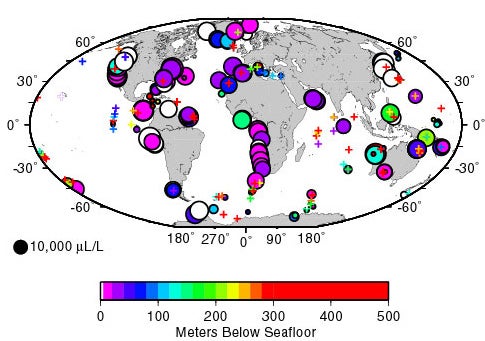The University of Rhode Island (URI) was a member organization of
the NASA Astrobiology Institute (NAI) from 2001-2006. This page is a
record of NAI URI activities during that time.
Program Objectives
The University of Rhode Island (URI) Team works to gain a fundamental understanding of the life that inhabits Earth’s deeply buried marine sediments. Earth’s deep biosphere is a critical component of Earth’s biogeochemical cycles and serves as a model for possible life on other planets. Consequently, the team’s objectives are to understand the subsurface microbial ecosystems of marine sediments, their role in Earth’s biogeochemical cycles, and their relevance to the search for life on other planets.
Individual projects of the URI Team seek to:
• Explore the taxonomic composition, metabolic activity and geochemical consequences of buried microbial ecosystems in marine sediments with widely different physical and chemical characteristics.
• Document the nature, extent, and perturbation-sensitivity of microbial activity in marine sediments, plus the effect of that activity on Earth’s biogeochemical cycles.
• Identify signatures of present and past microbial processes in Earth’s subsurface as a guide to predicting such signatures in extraterrestrial subsurface environments.
Environments of special interest include: 1) old, deeply buried sediments where life exists despite extremely low concentrations of electron donors and key nutrients, and 2) hot, deeply buried anoxic sediments where life may exist independently of the photosynthesis-based ecosystem at Earth’s surface. The ecosystems of these subsurface habitats are potentially representative of the ecosystems that may exist on other planets.
Research Approach
In addressing its objectives, the URI Team is playing a leading role in the international effort to recover and analyze microbiological and biogeochemical samples from deep beneath the seafloor. Team members utilize a broad range of research techniques to:
• Apply and develop biogeochemical techniques for identifying metabolic interactions and quantifying rates of metabolic activity in deeply buried sediments
• Document the genetic composition of deeply buried microbial communities
• Compile and analyze global databases of biogeochemical and physical properties that define the limits to life in deeply buried marine environments
• Computationally model subsurface microbial activities and their effects on both subsurface and surface environments
The approach of the URI Team is fundamentally interdisciplinary. Team members use advanced techniques from a wide range of fields, including microbiology, molecular biology, organic and inorganic biogeochemistry, geology and geophysics. The work is field-, laboratory-, and model-based. Team members routinely participate in Ocean Drilling Program (ODP) cruises and played a leading role in the first ocean drilling expedition to be dedicated to study of life deep beneath the seafloor (ODP Leg 201). To effectively accomplish the program’s goals, the URI Team’s investigators, post-doctoral researchers, graduate students, and select undergraduate students collaborate with each other, with other members of the NASA Astrobiology Institute, and with scientists at other institutions throughout the world
Team Members
| University of Rhode Island Steven D’Hondt, Principal Investigator, dhondt@gso.uri.edu Assistants Summer Undergraduate Research Fellows University of North Carolina—Chapel Hill Woods Hole Oceanographic Institution Max-Planck Institute for Marine Microbiology Massachusetts Institute of Technology Roger Williams University |

